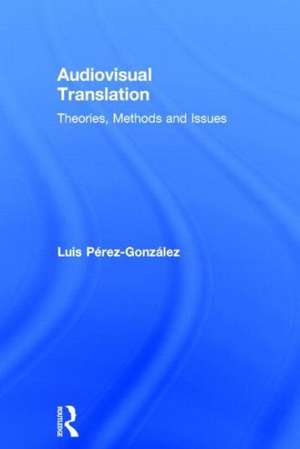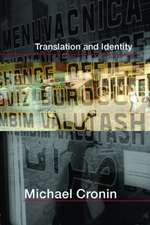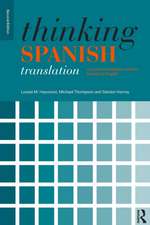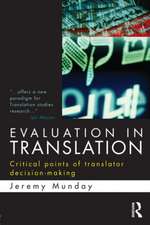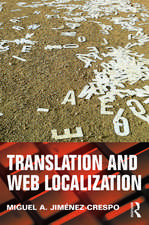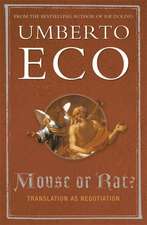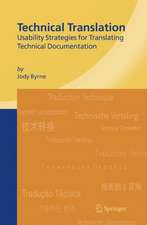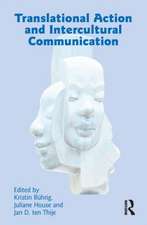Audiovisual Translation: Theories, Methods and Issues
Autor Luis Perez-Gonzalezen Limba Engleză Hardback – 13 aug 2014
This book addresses the need for more robust theoretical frameworks to investigate emerging text- types, address new methodological challenges (including the compilation, analysis and reproduction of audiovisual data), and understand new discourse communities bound together by the production and consumption of audiovisual texts.
In this clear, user- friendly book, Luis Pérez-González introduces and explores the field, presenting and critiquing key concepts, research models and methodological approaches.
Features include:
• introductory overviews at the beginning of each chapter, outlining aims and relevant connections with other chapters
• breakout boxes showcasing key concepts, research case studies or other relevant links to the wider field of translation studies
• examples of audiovisual texts in a range of languages with back translation support when required
• summaries reinforcing key issues dealt with in each chapter
• follow- up questions for further study
• core references and suggestions for further reading.
• additional online resources on an extensive companion website
This will be an essential text for all students studying audiovisual or screen translation at postgraduate or advanced undergraduate level and key reading for all researchers working in the area.
| Toate formatele și edițiile | Preț | Express |
|---|---|---|
| Paperback (1) | 343.32 lei 3-5 săpt. | +29.07 lei 6-12 zile |
| Taylor & Francis – 12 aug 2014 | 343.32 lei 3-5 săpt. | +29.07 lei 6-12 zile |
| Hardback (1) | 1000.27 lei 6-8 săpt. | |
| Taylor & Francis – 13 aug 2014 | 1000.27 lei 6-8 săpt. |
Preț: 1000.27 lei
Preț vechi: 1219.84 lei
-18% Nou
Puncte Express: 1500
Preț estimativ în valută:
191.40€ • 200.40$ • 158.75£
191.40€ • 200.40$ • 158.75£
Carte tipărită la comandă
Livrare economică 10-24 aprilie
Preluare comenzi: 021 569.72.76
Specificații
ISBN-13: 9780415530255
ISBN-10: 0415530253
Pagini: 376
Ilustrații: 47
Dimensiuni: 156 x 234 x 25 mm
Greutate: 0.45 kg
Ediția:New.
Editura: Taylor & Francis
Colecția Routledge
Locul publicării:Oxford, United Kingdom
ISBN-10: 0415530253
Pagini: 376
Ilustrații: 47
Dimensiuni: 156 x 234 x 25 mm
Greutate: 0.45 kg
Ediția:New.
Editura: Taylor & Francis
Colecția Routledge
Locul publicării:Oxford, United Kingdom
Public țintă
Postgraduate and UndergraduateCuprins
1.Mapping an Evolving Conceptual Network 2. Audiovisual Translation as a Site of Representational Practice 3. Audiovisual Translation as a Site of Interventionist Practice 4. Audiovisual Translation Models 5. Research Models in Audiovisual Translation 6. Multimodality 7. Self-mediation 8. Lead the Way
Notă biografică
Luis Pérez-González is a Senior Lecturer in Translation Studies at the Centre for Translation and Intercultural Studies, University of Manchester, UK, where he teaches screen translation, translation theory and intercultural pragmatics.
Recenzii
'This volume is an invaluable resource for readers looking to reflect on the past, present and future of the discipline of audiovisual translation as a whole and it provides an excellent starting point for scholars and graduate students looking for inspiration and, in particular, for theoretical and methodological grounding for their projects.' - Nina Reviers, University of Antwerp, Beligium, Linguistica Antverpiensia
'Audiovisual Translation: Theories, Methods and Issues is a seminal publication, eagerly anticipated and long deserved by the field of audiovisual translation...Pérez-González is one of the very few scholars who has acknowledged the need to chart the map of AVT as a discipline, an industry, and an interventionist practice, producing a monograph which aspires to occupy this very niche in the literature, while doing justice to the nature of multimodal texts and bringing into sharp relief the intimate link between AVT and digital literacies.' - Louisa Desilla, University College London, Perspectives
'An excellent overview of existing research in audiovisual translation studies, while providing readers with the methods and examples they would need to further develop this growing field.' - Julie McDonough Dolmaya, York University, Target
'Written by one of the leading scholars on the subject, Audiovisual Translation: Theories, Methods and Issues is an accessible and thorough introduction to the study of audiovisual translation in its different forms, providing a detailed examination of the concept of multimodality as well as a thoughtful exploration of fansubbing and other emerging practices, packed with examples and ideas to help students, professionals and general readers to become more informed and reflective about audiovisual translation.' - Yau Wai-ping, Hong Kong Baptist University
‘This is a fabulous, ambitious book that brings together research from far-flung disciplines – from fandom studies to neurolinguistics – to provide a comprehensive and insightful snapshot of audiovisual translation scholarship today. Skilfully analysing and illuminating this burgeoning area of study, it will appeal to students and researchers alike managing to combine accessibility with conceptual rigour.’ - Tessa Dwyer, University of Melbourne
'Luis Pérez-González successfully brings together distinct modes of audiovisual translation and offers a valid and systematic framework for their analysis. The robust and clear discussions of different theoretical models, research methodologies and tools of analysis for multimodal texts, accompanied by several resources such as interviews and follow up questions, represent an exciting and useful resource for undergraduate and postgraduate students, as well as researchers in this field.' - Alina Secară, University of Leeds
'With this landmark volume, Luis Pérez-González gives audiovisual translation scholarship the means to generate its futures. It is meticulously researched, intelligent, judicious, consummate in its ability to draw together the threads of AVT’s intricate (multi)modalities, to challenge both our knowledge and our ignorance, and to give our theories and methodologies the robust grounding and mutual responsiveness they have hitherto missed. Work like this will help AVT to establish its authority in the 21st century.’- Marie-Noëlle Guillot, University of East Anglia
'Luis Pérez-González's new book is essential reading for students and scholars working in audiovisual translation...The writing is clear, well-paced and punctuated with a range of examples that demonstrate the theories under discussion. Audiovisual Translation is unique in offering examples from subtitling, dubbing, audio-description and even multilingual versions (215-217), allowing comparisons across modes of translation. Combining originality, rigour and accessibility, it is an important addition to translation studies scholarship.' - Jonathan Evans, University of Portsmouth, The Journal of Specialised Translation
'...this textbook represents essential reading for anyone interested in or concerned with AVT. It is thoroughly researched, successfully brings different disciplines together and represents an excellent starting point for further explorations in the field of AVT.' - Ulrike Stange, Mainz University, The LINGUIST List
'As a scholarly monograph giving in-depth analysis of various newly emerged modes and practices of AVT from a truly multidisciplinary and intercultural viewpoint, [this book] is undoubtedly successful and a significant contribution to the field. It integrates AVT with film studies, sociology and critical discourse analysis […] It may be safely said that it is successful in its endeavour of carving out a niche for AVT as an independent subdiscipline within TS. Comprehensive monographs have so far been lacking on this subject. Pérez-González has now filled this void, and his work may prove to be a landmark in the study of AVT.' - Judit Sereg, Eötvös Loránd University, Across Languages and Cultures
'[T]his book […] not only manages to bring together issues that have become relevant to AVT authors, but also urges researchers to reflect critically upon the objects of study of the discipline. This is even more urgent at a time when the political situation in Europe and the United States requires citizen participation more than ever before, as media translation is necessary to make well-informed choices and to be well informed. In this sense, the book is a must-read not only for translation scholars, but also for all those who still believe the Humanities do not have anything to say to the society that finances our research.' - Roberto A. Valdeoìn, University of Oviedo, Babel
'Audiovisual Translation: Theories, Methods and Issues is a seminal publication, eagerly anticipated and long deserved by the field of audiovisual translation...Pérez-González is one of the very few scholars who has acknowledged the need to chart the map of AVT as a discipline, an industry, and an interventionist practice, producing a monograph which aspires to occupy this very niche in the literature, while doing justice to the nature of multimodal texts and bringing into sharp relief the intimate link between AVT and digital literacies.' - Louisa Desilla, University College London, Perspectives
'An excellent overview of existing research in audiovisual translation studies, while providing readers with the methods and examples they would need to further develop this growing field.' - Julie McDonough Dolmaya, York University, Target
'Written by one of the leading scholars on the subject, Audiovisual Translation: Theories, Methods and Issues is an accessible and thorough introduction to the study of audiovisual translation in its different forms, providing a detailed examination of the concept of multimodality as well as a thoughtful exploration of fansubbing and other emerging practices, packed with examples and ideas to help students, professionals and general readers to become more informed and reflective about audiovisual translation.' - Yau Wai-ping, Hong Kong Baptist University
‘This is a fabulous, ambitious book that brings together research from far-flung disciplines – from fandom studies to neurolinguistics – to provide a comprehensive and insightful snapshot of audiovisual translation scholarship today. Skilfully analysing and illuminating this burgeoning area of study, it will appeal to students and researchers alike managing to combine accessibility with conceptual rigour.’ - Tessa Dwyer, University of Melbourne
'Luis Pérez-González successfully brings together distinct modes of audiovisual translation and offers a valid and systematic framework for their analysis. The robust and clear discussions of different theoretical models, research methodologies and tools of analysis for multimodal texts, accompanied by several resources such as interviews and follow up questions, represent an exciting and useful resource for undergraduate and postgraduate students, as well as researchers in this field.' - Alina Secară, University of Leeds
'With this landmark volume, Luis Pérez-González gives audiovisual translation scholarship the means to generate its futures. It is meticulously researched, intelligent, judicious, consummate in its ability to draw together the threads of AVT’s intricate (multi)modalities, to challenge both our knowledge and our ignorance, and to give our theories and methodologies the robust grounding and mutual responsiveness they have hitherto missed. Work like this will help AVT to establish its authority in the 21st century.’- Marie-Noëlle Guillot, University of East Anglia
'Luis Pérez-González's new book is essential reading for students and scholars working in audiovisual translation...The writing is clear, well-paced and punctuated with a range of examples that demonstrate the theories under discussion. Audiovisual Translation is unique in offering examples from subtitling, dubbing, audio-description and even multilingual versions (215-217), allowing comparisons across modes of translation. Combining originality, rigour and accessibility, it is an important addition to translation studies scholarship.' - Jonathan Evans, University of Portsmouth, The Journal of Specialised Translation
'...this textbook represents essential reading for anyone interested in or concerned with AVT. It is thoroughly researched, successfully brings different disciplines together and represents an excellent starting point for further explorations in the field of AVT.' - Ulrike Stange, Mainz University, The LINGUIST List
'As a scholarly monograph giving in-depth analysis of various newly emerged modes and practices of AVT from a truly multidisciplinary and intercultural viewpoint, [this book] is undoubtedly successful and a significant contribution to the field. It integrates AVT with film studies, sociology and critical discourse analysis […] It may be safely said that it is successful in its endeavour of carving out a niche for AVT as an independent subdiscipline within TS. Comprehensive monographs have so far been lacking on this subject. Pérez-González has now filled this void, and his work may prove to be a landmark in the study of AVT.' - Judit Sereg, Eötvös Loránd University, Across Languages and Cultures
'[T]his book […] not only manages to bring together issues that have become relevant to AVT authors, but also urges researchers to reflect critically upon the objects of study of the discipline. This is even more urgent at a time when the political situation in Europe and the United States requires citizen participation more than ever before, as media translation is necessary to make well-informed choices and to be well informed. In this sense, the book is a must-read not only for translation scholars, but also for all those who still believe the Humanities do not have anything to say to the society that finances our research.' - Roberto A. Valdeoìn, University of Oviedo, Babel
Descriere
From the lucrative blockbusters distributed by powerful Hollywood studios to the brief videos assembled and circulated by ordinary people, contemporary screen culture is populated by a growing variety of audiovisual texts travelling across different languages and cultures. Through a range of examples drawn from different genres, this book moves beyond the linguistic concerns traditionally privileged within audiovisual translation, introducing students and researchers to the artistic, economic, social and political dimensions of this activity.
It is essential reading for all students studying Audiovisual or Screen Translation at postgraduate or advanced undergraduate level and key reading for all researchers working in the area.
It is essential reading for all students studying Audiovisual or Screen Translation at postgraduate or advanced undergraduate level and key reading for all researchers working in the area.
